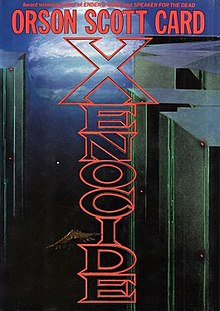Xenocide

Cover of first edition (hardcover)
|
|
| Author | Orson Scott Card |
|---|---|
| Country | United States |
| Language | English |
| Series | Ender's Game series |
| Genre | Science fiction |
| Published | 1991 (Tor Books) |
| Media type | Print (Hardcover, Paperback & ebook) |
| Pages | 592 pp |
| ISBN | |
| OCLC | 22909973 |
| 813/.54 20 | |
| LC Class | PS3553.A655 X46 1991 |
| Preceded by | Speaker for the Dead |
| Followed by | Children of the Mind |
Xenocide (1991) is the third novel in the Ender's Game series of books by Orson Scott Card. It was nominated for both the Hugo and Locus Awards for Best Novel in 1992. The title is a combination of '', meaning alien, and '-cide', referring to the act of killing; altogether referring to the act of selectively killing populations of aliens, a play on genocide.
On Lusitania, Ender finds a world where humans and pequeninos and the Hive Queen could all live together; where three very different intelligent species could find common ground at last. Or so he thought.
Lusitania also harbors the descolada, a virus that kills all humans it infects, but which the pequininos require in order to become adults. The Starways Congress so fears the effects of the descolada, should it escape from Lusitania, that they have ordered the destruction of the entire planet, and all who live there. With The Fleet on its way, a second xenocide seems inevitable.
Following the events of Speaker for the Dead, a group of characters are depicted living as members of a Brazilian Catholic human colony on Lusitania, a unique planet inhabited by the only other two known species of sentient alien life: the Pequeninos "little ones" and the Hive Queen. The pequeninos are native to the planet, while the Hive Queen was transplanted to this world by Ender, partly in penance for his near-total destruction of her Formic species in Ender's Game.
The Lusitanian ecosystem is pervaded by a complex virus, dubbed 'Descolada' (Portuguese for "no longer glued") by humans. The Descolada breaks apart and rearranges the basic genetic structure of living cells. It is extremely adaptable to any species or form of known life, and easily transmissible. The native pequeninos and other life that survived on Lusitania after the Descolada's introduction to the planet thousands (or millions) of years ago are adapted to it. As a result of the deadly virus, the Lusitanian ecosystem is severely limited. Staying alive on Lusitania takes immense effort and research on the part of the Hive Queen and the humans, as they are not adapted to the descolada. Near the end of the story, it is revealed the Descolada is possibly an artificially engineered virus designed to terraform planets, but the original creators of the virus are unknown, and there remains a slim chance it evolved naturally.
...
Wikipedia
